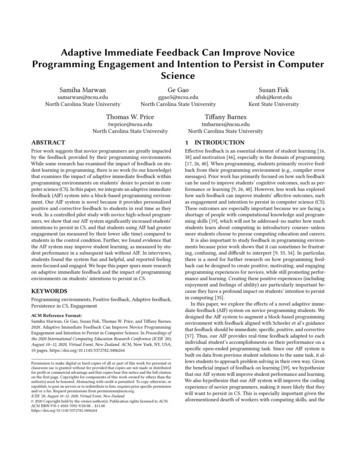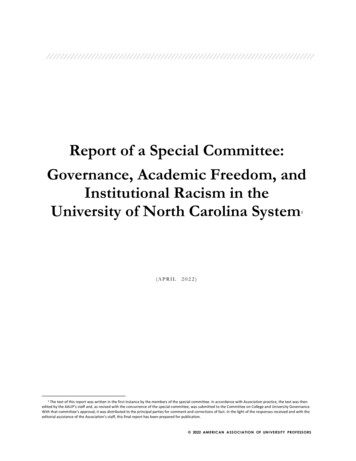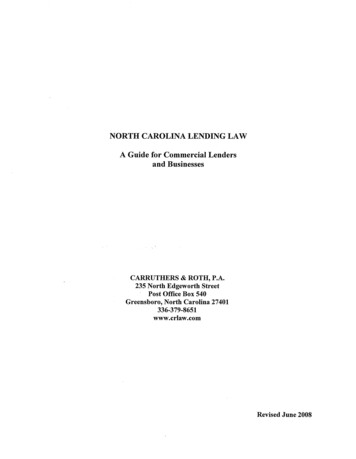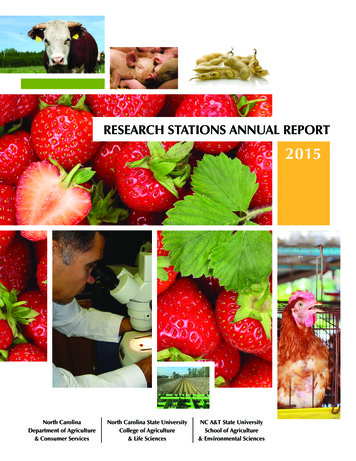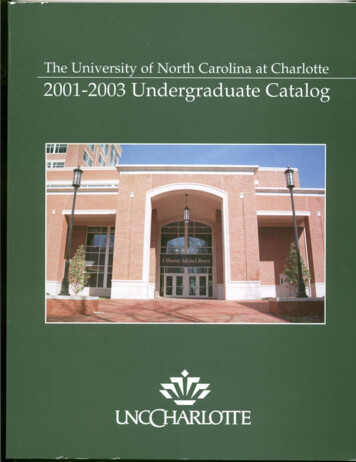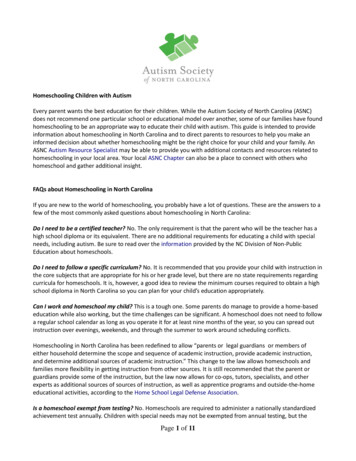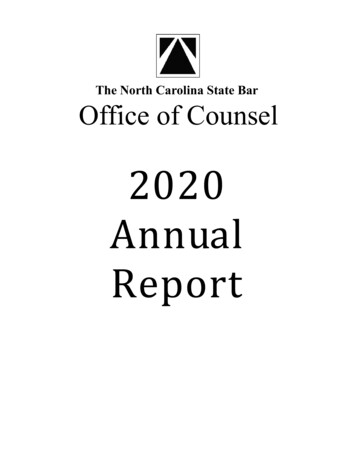
Transcription
The North Carolina State BarOffice of Counsel
Office of Counsel StaffLAWYERSKatherine E. Jean, CounselMargaret T. Cloutier, Sr. Deputy CounselCarmen H. Bannon, Deputy CounselMaria J. Brown, Deputy CounselSusannah B. Cox, Deputy CounselElizabeth Foley, Deputy CounselLeanor B. Hodge, Trust Account Compliance Counsel &Deputy CounselDavid R. Johnson, Deputy CounselJ. Cameron Lee, Deputy CounselBarry M. McNeill, Deputy CounselG. Patrick Murphy, Deputy CounselAlex G. Nicely, Deputy CounselSavannah B. Perry, Deputy CounselJennifer A. Porter, Deputy CounselFern Gunn Simeon, Deputy CounselJoshua T. Walthall, Deputy CounselRobert W. Weston, Deputy CounselExt. 276Ext. 239Ext. 283Ext. 213Ext. 235Ext. 254Ext. 299Ext. 230Ext. 293Ext. 298Ext. 206Ext. 281Ext. 219Ext. 262Ext. 258Ext. 225Ext. 204ADMNINISTRATIVE STAFFHeather Pattle, Director of OperationsLori Brooks, Administrative AssistantBecky Carroll, ParalegalTyler Gibbens, ParalegalMary Lee, Trust Account ParalegalJeffrey Lundgren, ParalegalWondella Payne, ParalegalJoan Renken, Administrative AssistantMike Shirley, ParalegalJennifer Slattery, ParalegalBrittany Wilson, ParalegalExt. 227Ext. 232Ext. 234Ext. 254Ext. 251Ext. 120Ext. 296Ext. 295Ext. 121Ext. 205Ext. 280INVESTIGATORSJoe Commisso, Director of InvestigationsAnne Parkin, Random AuditorKrista Carlson, InvestigatorMarty Coolidge, InvestigatorRick Grayson, InvestigatorDoug Miller, InvestigatorCarolyn Page, InvestigatorFred Patton, InvestigatorPaul Sugrue, InvestigatorWayne Truax, InvestigatorExt. 200Ext. 259Ext. 224Ext. 294Ext. 274Ext. 263Ext. 285Ext. 266Ext. 284Ext. 2921 of 21
INVESTIGATIONS ADMNINISTRATIVE STAFFJulie Ferrer, Investigative ClerkDawn Patton, Administrative AssistantSonja Puryear, Investigative ClerkChris Woods, Investigative AssistantExt. 355Ext. 278Ext. 203Ext. 222ATTORNEY/CLIENT ASSISTANCE PROGRAM STAFFLee A. Ramos, DirectorTodd Bascom, Public LiaisonKerri Bianchi, Fee Dispute FacilitatorAndrea Koretsky, Administrative AssistantDiane Melching, Administrative AssistantCourtney Pope, Public LiaisonSandra Saxton, Intake CoordinatorExt. 277Ext. 297Ext. 228Ext. 243Ext. 287Ext. 260Ext. 264OFFICE OF COUNSELThe Office of Counsel (“OOC”) is the legal department of the North Carolina State Bar. The OOCconsists of disciplinary staff, authorized practice staff, the investigations department, theAttorney/Client Assistance Program (ACAP) staff, and the Trust Accounting Compliance Program. TheOOC reports to the Grievance Committee upon all grievance files opened by the State Bar involvingallegations of professional misconduct by North Carolina lawyers. It investigates and tries claims ofprofessional misconduct and disability. The OOC assists the Authorized Practice Committee byinvestigating and reporting upon complaints concerning the unauthorized practice of law, includingrepresenting the State Bar in lawsuits to obtain injunctions prohibiting the unauthorized practice of law.I t provides legal counsel to the Client Security Fund Board of Directors and pursues subrogationactions for recovery of funds paid by the CSF. It coordinates the appointment of trustees to wind downthe practices of deceased, disabled, disbarred and missing lawyers and obtains court orders to disbursefunds in their trust accounts. The OOC represents the State Bar in litigation in federal and state trial andappellate courts and provides legal opinions on issues of interest to all departments, committees, andboards of the State Bar.The ACAP staff helps members of the public resolve problems with lawyers other than mattersinvolving potentially serious violations of the Rules of Professional Conduct. The ACAP staff alsoprovides information about the grievance process, the courts and the justice system, and helps resolvefee disputes between lawyers and their clients.The OOC includes seventeen lawyers, one of whom serves as trust account compliance counsel, onedirector of operations, ten investigators, one random auditor, eight paralegals, five administrativeassistants, one investigative assistant, two investigative clerks, the ACAP director, who is also a feedispute resolution facilitator, a second fee dispute resolution facilitator, an intake coordinator and twopublic liaisons.The Office of Counsel is located in the State Bar Building, 217 E. Edenton St., Raleigh, N.C. 27601.It is open from 9 a.m. until 5 p.m. on weekdays and may be reached at 919-828-4620. Each staffperson’s telephone extension appears above.2 of 21
2020 ANNUAL REPORTOFFICE OF COUNSELTHE NORTH CAROLINA STATE BARAttorney Client Assistance ProgramThe Attorney Client Assistance Program (“ACAP”) is comprised of seven staff members: the director,who is also a fee dispute resolution facilitator, a second fee dispute resolution facilitator, an intakecoordinator, two public liaisons, and two administrative assistants. During 2020, the staff responded to4,593 calls from clients and other members of the public. The ACAP staff also responded to 2,005 lettersfrom inmates and 5,230 email messages from clients and lawyers. The ACAP staff contacted 1,188lawyers in attempts to resolve clients’ concerns.The State Bar opened 350 fee dispute resolution files during 2020. All 350 fee dispute resolution fileswere assigned to two in-house facilitators.Authorized Practice CommitteeThe Authorized Practice Committee opened 57 investigation files in 2020, compared to 63 investigations in2019, 82 files in 2018, 107 files in 2017, 87 files in 2016, and 108 files in 2015. The committee resolved 48files in 2020, compared to 73 files during 2019, 91 files during 2018, 90 files in 2017, 97 files in 2016, and110 files in 2015.The committee also registers prepaid legal service plans. Plans must file initial registration statement formsand amended registrations and submit annual renewals. The committee does not approve plans but doesreview registrations to confirm that proposed plans and amendments fall within the definition of a prepaidlegal service plan. During 2020, nine proposed plans were submitted for registration; eight wereregistered. The OOC is reviewing the remaining submission. Two hundred eighteen amendments weresubmitted for existing plans, all of which were registered.In July 2017, the Executive Committee authorized the OOC to file a lawsuit seeking injunctive reliefagainst Michael Asen and the Zimmerman Group. Asen is a New York attorney. It was alleged thatAsen attempted to collect civil penalties from persons accused of shoplifting in North Carolina and thatt he Zimmerman Group offered Asen’s services to retailers. The parties entered into a consent injunction.In October 2020, the Executive Committee authorized the Office of Counsel to file a lawsuit againstTammy Alexander seeking injunctive relief. It is alleged that Alexander, a paralegal, has been filingdocuments with the court advocating the legal positions of at least three incarcerated defendants. Thecomplaint has been filed and service of the complaint is pending.The OOC continues to work closely with the Consumer Protection Division of the North Carolina AttorneyGeneral’s Office to prevent the unauthorized practice of law in North Carolina, particularly involvingpersons and entities that offer legal services in the areas of debt adjusting, loan modification, andpreparation of living trusts for senior citizens.3 of 21
Trust Accounting Compliance ProgramForty lawyers currently participate in the Trust Accounting Compliance Program. In 2020, thirteenlawyers successfully completed the program. In 2019, seven lawyers successfully completed the program.In 2018, thirteen lawyers successfully completed the program. In 2017, nine lawyers successfullycompleted the program.Grievance Committee ActionsDuring 2020, the Grievance Committee opened 927 grievance files, compared with 1,258 files opened in2019.In 2020, the OOC did not review any inquiries about lawyer advertising. The OOC reviewed three directmail solicitation letters in 2019. All involved minor violations of advertising ethics rules. The GrievanceCommittee opened three grievance files in 2019.All grievance files are considered and acted upon by one or more members of the Grievance Committee.The committee considered a total of 763 grievance files in 2020. Of those, 538 were dismissed. Elevenfiles were dismissed and retained because the respondent lawyers had been disbarred. Seven files wereabated because the respondent lawyers had been transferred to disability inactive status. These filesrepresent approximately 73 percent of the grievance files considered by the committee. In addition to thegrievance files that were dismissed outright in 2020, 17 files were dismissed with letters of caution and54 were dismissed with letters of warning.In 2020, the Grievance Committee issued admonitions in 40 files, reprimands in 13 files and censures innine files. Seventy-three files involving 37 lawyers were referred for trial before the Disciplinary HearingCommission (DHC). A total of 125 grievance files resulted in either imposition of discipline by theGrievance Committee or referral to the DHC. That figure represents approximately eighteen percent of thegrievances considered by the committee in 2020. The committee referred six lawyers to the LawyerAssistance Program and referred 27 lawyers to the Trust Accounting Compliance Program.Cases Before the Disciplinary Hearing CommissionThe DHC is the independent tribunal which hears lawyer discipline and disability cases. The 20-membercommission hears cases involving alleged violations of the Rules of Professional Conduct, cases in whichit is alleged that a lawyer is disabled, petitions from disbarred and suspended lawyers seeking reinstatementof their law licenses, and petitions to require a lawyer to show cause why he or she should not be foundto have violated an existing order of the DHC. Each case is heard by a panel of three consisting of twolawyers and one public member.During 2020, the OOC completed a total of 23 disciplinary cases before the DHC, representing 34 filesreferred by the Grievance Committee. Of those, six were resolved by hearing or default judgment and 28were resolved by consent. The OOC also completed three show cause motions, and one grievancenoncompliance case before the DHC. In 2019, the office completed 36 such cases of which nine wereresolved by trial and 27 were resolved by consent.4 of 21
1.Discipline and Disability CasesIn 2020, the DHC entered seven orders of disbarment. One lawyer misappropriated funds. One lawyerneglected a client’s case, made multiple false statements to her client, opposing counsel and the court, andfabricated documents. One lawyer did not ensure that a client’s estate planning documents were properlyexecuted and amended to effectuate the client’s desires, notarized a false acknowledgement, knowinglyassisted in probating an invalid will, and made false statements to third parties and the State Bar. Onelawyer willfully failed to account for and pay over to the IRS payroll taxes withheld from the paychecksof his law firm employees. One lawyer was convicted in Florida of the criminal offenses of promoting thesexual performance of a child by transmitting child pornography over the internet, engaging in sexual actsover the internet with reason to believe he was being viewed by a minor, and solicitation of a personbelieved to be a child over the internet. One lawyer pled guilty to the felony offense of conspiracy toobtain money in the custody of a bank by false pretenses by, among other devices, misrepresenting tolenders that his client was purchasing houses as rental property when his client was actually purchasingthem as marijuana grow houses for a large-scale drug trafficking operation. One lawyer pled guilty tonumerous felony offenses of obtaining or attempting to obtain controlled substances by fraud. He alsoprovided the State Bar a letter bearing a forged signatureIn 2020, the DHC imposed four active suspensions, three suspensions in which the lawyer could seek astay after serving some period of active suspension, and eight suspensions entirely stayed upon thelawyer’s compliance with various conditions. The OOC filed three show cause petitions against threelawyers. In one case, the DHC activated the suspension imposed by the order of discipline, and in twocases the stay was continued or extended. The DHC censured one lawyer. The DHC entered interimsuspensions of the law licenses of two lawyers while disciplinary proceedings are pending.2.Petitions for Stay and for ReinstatementIn 2020, the DHC did not consider any petitions for reinstatement.Actions Before the State Bar Council1. Tenders of Surrender of LicenseIn 2020, three lawyers surrendered their law licenses to the State Bar Council and were disbarred. Onelawyer was convicted in the Eastern District of Pennsylvania of one count of tax evasion, in violation of26 U.S.C. § 7201, and one count of conspiracy to defraud the IRS, in violation of 18 U.S.C. § 371. Onelawyer misappropriated entrusted funds totaling at least 11,892.90. One pled guilty in the United StatesDistrict Court for the Western District of Virginia to one count of Transmission of InterstateCommunications with Intent to Extort in violation of Title 18 U.S.C., Section 875 (d).2. Reinstatement ProceedingsIn 2020, the Council did not consider any reinstatement petitions from disbarred lawyers.5 of 21
Actions Before the SecretaryThe Secretary receives reinstatement petitions from lawyers whose licenses are suspended for disciplinaryviolations and enters reinstatement orders in uncontested cases. Contested petitions for reinstatement arereferred to the DHC for trial.No lawyers filed reinstatement petitions which were addressed by the Secretary in 2020.Actions Before the State Trial Courts1. Judicial DisbarmentsIn 2020, three lawyers were disbarred by the Wake County Superior Court. Two misappropriatedentrusted funds. One pled guilty to four counts of lobbying without registration, one count of obstructionof justice, and one count of criminal contempt, all misdemeanors.2. Injunction ProceedingsDuring 2020, the OOC obtained injunctions prohibiting ten lawyers from handling entrusted funds,compared with nineteen such injunctions in 2019.3. Appointment of Trustees for Law Practices of Missing, Deceased, Disabledand Disbarred LawyersIn 2020, the OOC petitioned the courts to appoint trustees to wind down the law practices of 20 lawyers.Three lawyers suffered from disabling conditions that made them unavailable to clients, one lawyer wasdisbarred, and sixteen lawyers were deceased. The OOC filed 20 trustee petitions in 2019.4. Other Discipline and Disability Cases in the State Trial CourtsOne lawyer was enjoined in Wake County from handling entrusted funds and from serving in any fiduciarycapacity. He was then serving as trustee of a testamentary trust and did not resign when the injunction wasentered. The court ordered him to show cause why he should not be held in civil contempt for violatingthe injunction. After hearing, the court found that his lack of compliance was not willful and directed himto resign from the trusteeship within ten days. He did not resign. He eventually resigned after the courtentered another order to show cause why he should not be held in contempt.One lawyer represented the defendant in a homicide prosecution in Henderson County. The court orderedhim to show cause why he should not be disciplined for redacting a portion of an expert’s notes andproviding the redacted notes to the district attorney without advising the district attorney of the redaction.The order memorializing the court’s ruling is under seal until conclusion of the underlying criminal case.One lawyer was enjoined in Wake County Superior Court and the court ordered him to provide trustaccount and client records to the State Bar. The court granted the State Bar’s motion for an order requiringhim to show cause why he should not be held in contempt for failing to produce the required documents.After multiple hearings necessitated by last-minute document production and requests for more time toproduce additional documents, the court determined that the lawyer was not in contempt of court.6 of 21
5. MiscellaneousAs usual, in 2020 the State Bar was a party to numerous actions in the State courts and administrativetribunals. The OOC represented the State Bar in many of these actions. In nine cases, the State Bar wasrepresented by the Attorney General.At the end of 2020, there were three lawsuits pending in superior court seeking reimbursement from adisbarred lawyer for payments made by the CSF.During 2020, the OOC filed six pleadings in Superior Court for permission to disburse or escheat fundsin the trust accounts of suspended or disbarred lawyers, attended six hearings on motions to disburse orescheat, and obtained seven orders directing the disbursement or escheatment of entrusted funds totaling 88,382.01.In 2020, the State Bar was also a party to the following cases in state trial courts and administrativetribunals:Richard Polidi v. Colon Willoughby et al (Wake County Superior Court). Polidi surrendered his lawlicense and was disbarred by the Wake County Superior Court in 2014. He filed this action in July 2017against Colon Willoughby in his official and individual capacities, against Katherine Jean in her officialand individual capacities, and against many others. It is unclear whether Polidi sued Colon Willoughbyin his official capacity as the former elected district attorney of Wake County or in his official capacity asa State Bar councilor. Willougby is now Past President of the State Bar but was not an officer when thislawsuit was filed. Polidi makes vague, generalized allegations of wrongful conduct in connection with hisdecision to surrender his law license and consent to be disbarred. He has never served Willoughby orJean. If he does, the OOC will represent them.Richard Polidi v. Carmen Bannon (Wake County Superior Court). Polidi surrendered his law licenseand was disbarred by the Wake County Superior Court in 2014. In July 2017, he filed this action againstCarmen Bannon, State Bar deputy counsel, in her official and individual capacities. Polidi makes vague,generalized allegations relating to his decision to surrender his law license and consent to be disbarred.He has never served Bannon. If he does, the OOC will represent her.Ballentine International Express Trust/Trustee Board by Trustee v. State of North Carolina et al(NC Industrial Commission). This is a purported tort claim against numerous defendants. Ballentine isa purported trust formed in an effort to defeat a foreclosure. Ballentine alleges the foreclosure waswrongful because the grantor of the deed of trust conveyed the property to the trust and the trusteecancelled the deed of trust. Ballentine contends that the clerk of court and a lawyer for the trustee wereagents of the State Bar because they are licensed to practice law in North Carolina but alleges no facts thatcould sustain that contention. Ballentine alleges no acts or omissions by the State Bar. The deputycommissioner dismissed all claims against all defendants on his own motion. The Full Commission heldthat the deputy commissioner lacked authority to dismiss the claim against the State Bar on his own motionand remanded to the deputy commissioner. Meanwhile, the petitioner appealed dismissal of the claimsagainst the other defendants to the North Carolina Court of Appeals. The Court of Appeals dismissedthose appeals. The State Bar’s motion to dismiss has not been scheduled for hearing. The AttorneyGeneral represents the State Bar.7 of 21
North Carolina State Bar v. Alan Phillips (Wake County Superior Court). Phillips was a licenseeand a grievance respondent. The grievance alleged that Phillips engaged in the unauthorized practice oflaw in other jurisdictions. Phillips filed an objection and motion to quash a subpoena issued by theGrievance Committee for production of information relating to his alleged misconduct. The President ofthe State Bar denied Phillips’ motion and ordered him to produce the subpoenaed documents. He did notdo so. The State Bar filed this action seeking a mandatory injunction enforcing the subpoena. Phillipsobjected to the State Bar’s discovery requests, contending that the State Bar was prohibited by an allegedconflict of interest from investigating a grievance against him because, while the grievance was pending,he filed his own grievances against State Bar officers, councilors and employees. The trial court overruledPhillips’ objection and ordered him to provide complete discovery responses. Phillips did not do so bythe deadline in the court’s order. Phillips filed a notice of appeal but did not obtain a stay of the order.Phillips was repeatedly held in contempt and was imprisoned four times for a total of 79 days. The courtalso disbarred Phillips effective July 1, 2019. The Court of Appeals affirmed the disbarment order onNovember 17. The OOC represented the State Bar.Christopher Livingston v. N.C. State Bar, et al (Wake County Superior Court). Livingston is alicensee. In July 2016, the DHC suspended him for five years. The DHC order was affirmed on appeal.In January 2018, Livingston sued the State Bar and the district bar in federal court alleging that the districtbar improperly used mandatory district bar dues. Livingston added John Silverstein (chair of theGrievance Committee that found probable cause) and Leanor Hodge (deputy counsel who prosecutedLivingston) as defendants, alleging that they selectively prosecuted him. In February 2019, the federalcourt granted the State Bar defendants’ motion to dismiss for lack of subject matter jurisdiction. In March2019, Livingston filed this action, a nearly identical complaint, in Wake County Superior Court.Livingston never served any defendant. On June 3, he obtained alias and pluries summonses but neverserved them. The State Bar first learned of the Wake County lawsuit in September 2019, when the trialcourt administrator directed the parties to prepare a case management order. The State Bar notified thetrial court administrator that, because no defendant has been served, the case should be discontinued. TheState Bar has heard nothing further from the trial court administrator and the case has not been scheduledfor hearing. The OOC represents the State Bar defendants.Valerie Arroyo v. Daniel Zamora et al (NC Industrial Commission). This and the following twoentries are purported tort claims filed by Arroyo against the State Bar and other entities and officials.These three files, and six additional claims Arroyo filed against other individuals and agencies, have allbeen dismissed and have been consolidated into a single appeal. In this claim, Arroyo alleges that theState Bar failed to “stop, act or prosecute” Daniel Zamora. The Full Industrial Commission heard the StateBar’s motion to dismiss in November 2020 but has not yet ruled. The Attorney General represents theState Bar.Valerie Arroyo v. North Carolina State Bar (NC Industrial Commission). In this claim, Arroyoalleges that the State Bar violated her rights by refusing to discipline licensee Zamora. The Full IndustrialCommission heard the State Bar’s motion to dismiss in November 2020 but has not yet ruled. TheAttorney General represents the State Bar.Valerie Arroyo v. North Carolina State Bar (NC Industrial Commission). In this claim, Arroyoalleges that the State Bar violated her rights by refusing to discipline licensee Diamond. The Full IndustrialCommission heard the State Bar’s motion to dismiss in November 2020 but has not yet ruled. TheAttorney General represents the State Bar.8 of 21
Valerie Arroyo v. Josh Stein, et al (Mecklenburg County Superior Court). Arroyo has previouslyfiled claims in state and federal courts against the State Bar which have been dismissed. In August 2020,Arroyo filed this action in Mecklenburg County against the Attorney General of North Carolina, the Stateof North Carolina, and a host of other state agencies and officials, including the State Bar, two State Barcouncilors, and three members of the OOC. Arroyo makes vague allegations about a grievance. TheAttorney General represents the State Bar.Kelvin Exum v. North Carolina State Bar (NC Office of Administrative Hearings). Exum filed agrievance, which was dismissed. Exum demanded an explanation for the dismissal. The State Bar sentExum a letter in response. Exum alleges that the letter was unsolicited, that it contains false and unfoundedinformation about him, and that it served no purpose other than to embarrass and harass him. The OAHdismissed Exum’s claim. He appealed to Wake County Superior Court. Hearing has not been scheduled.The Attorney General represents the State Bar.Isabella Amor v. Macon County DSS, Macon County Sheriff’s Department, NC State Bar et al (NCIndustrial Commission). Amor filed this purported tort claim against two Macon County agencies andthe State Bar. She alleges that she filed a grievance against a lawyer involved in a DSS proceedinginvolving her children and that the State Bar did not demand that the lawyer be removed from theproceeding. The State Bar’s motion to dismiss is pending. A pretrial hearing is scheduled for January 19,2021. The Attorney General represents the State Bar.Kareem Abdullah Kirk v. North Carolina State Bar Grievance Committee (NC Office ofAdministrative Hearings). Kirk alleges that the Grievance Committee did not properly address agrievance. This is the second claim Kirk, who also goes by the name Kareem Abdullah Kirk-Bey, hasfiled against the State Bar at OAH. OAH dismissed the previous claims in 2017, concluding that it didnot have subject matter jurisdiction. The State Bar’s motion to dismiss is pending. The Attorney Generalrepresents the State Bar.N.C. State Bar v. Tammy Alexander (Wake County Superior Court). At the October 2020 meeting,the Executive Committee authorized counsel to pursue injunctive relief against Tammy Alexander, aparalegal who has been submitting legal arguments to the court on behalf of incarcerated defendants. Thecomplaint has been filed and service of the complaint is pending. The OOC represents the State Bar.Derek Olivaria v. North Carolina State Bar (NC Industrial Commission). Olivaria filed thispurported tort claim alleging that three lawyers engaged in misconduct in an eviction action. Olivariadoes not allege any act or omission by the State Bar. The deputy commissioner dismissed the claims withprejudice on June 29, 2020. Olivaria did not appeal by the July 14, 2020 deadline. The Attorney Generalrepresented the State Bar.Actions Before the State Appellate CourtsThe OOC represented the State Bar in seven appeals in 2020.In re Phillip Entzminger - 17 CRS 1930 (Pitt County)The Pitt County Superior Court ordered Entzminger, an assistant district attorney, to show cause why heshould not be held in criminal contempt and why he should not be disciplined. The show cause orderalleged that Entzminger filed a document showing disregard for the dignity of the court, demonstratedundignified and discourteous conduct that was degrading to the court and that bred disrespect for the court9 of 21
and the legal profession, and made false statements to the court. The court appointed the Office of Counselto prosecute. The court acquitted Entzminger of contempt but concluded that he violated the Rules ofProfessional Conduct. The court suspended Entzminger for two years with the possibility of a stay afterhe serves the first six months of the suspension. Entzminger appealed. The Court of Appeals affirmed inpart, reversed in part, and remanded for a new hearing on the appropriate discipline. The Supreme Courtdenied Entzminger’s petition for discretionary review on August 12, 2020.David Shawn Clark - 19BCR1Clark, of Hickory, was disbarred in 2013. He had sex with a client, made false statements to a tribunaland to the Grievance Committee, attempted to suborn perjury, was convicted of several criminal chargesincluding communicating threats and obstruction of justice, intentionally disclosed client confidences, andengaged in a conflict of interest. He petitioned for reinstatement from disbarment. The DHCrecommended denial of the petition. Clark appealed to the Council. At its October 25, 2019 meeting, theCouncil denied the petition for reinstatement. On July 21, 2020, the Court of Appeals affirmed the Councilorder denying reinstatement.NC State Bar v. Clinton Moore - 18 DHC 43Moore, of Charlotte, obtained property by false pretense, misappropriated entrusted funds totaling 14,000.00, and neglected clients. In September 2019, he was disbarred by the DHC. He appealed. Hisproposed record on appeal was due January 27, 2020. He did not timely serve a proposed record. TheDHC dismissed the appeal.NC State Bar v. Venus Springs - 18 DHC 25Springs, of Mecklenburg County, posted on her YouTube channel a link to the video deposition of anopposing party’s representative. The DHC concluded that posting the video served no substantial purposeother than to humiliate or embarrass the witness. Springs maintained the link on her YouTube channel foreleven months after a federal court ordered her to remove it. The DHC reprimanded her. She appealed.The Court of Appeals affirmed. On October 6, Springs filed a notice of appeal and petition fordiscretionary review with the North Carolina Supreme Court. The State Bar responded. The Court hasnot ruled.NC State Bar v. Alan Phillips - 18CVS5645 (Wake County)Phillips was a licensee and was the respondent in a grievance alleging that he engaged in the unauthorizedpractice of law in other jurisdictions. Phillips filed an objection and motion to quash a subpoena issued bythe Grievance Committee. The President of the State Bar issued an order requiring Phillips to producethe subpoenaed documents. He did not do so. The State Bar filed this action seeking a mandatoryin
registered. The OOC is reviewing the remaining submission. Two hundred eighteen amendments were submitted for existing plans, all of which were registered. In July 2017, the Executive Committee authorized the OOC to file a lawsuit seeking injunctive relief against Michael Asen and the Zimmerman Group. Asen is a New York attorney. It was alleged .





